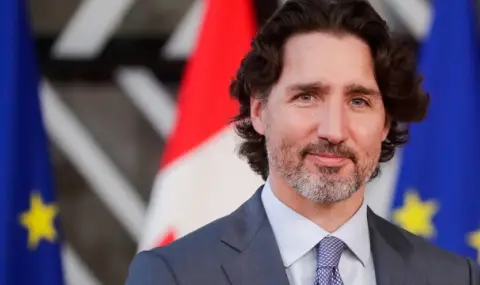Prime Minister Justin Trudeau's Liberal Party of Canada lost the election in Toronto - St. Paul area for the first time since 1988, the world agencies reported. This small loss also raised questions about the fate of Trudeau himself, who will probably fight for a fourth term next year.
On Tuesday, Conservative Don Stewart won a by-election produced after the lawmaker left the district, Canadian public broadcaster CBC reported. He beat Liberal candidate Leslie Church with 42.1% to 40.5% of the vote. In the 2021 election, Trudeau's party won in the area with a landslide majority of 49 percent to 22 percent.
Analyst Eric Grenier, who runs thewrit.ca, said that while polls had suggested the by-election would be close, even the Conservatives were likely surprised by the victory. "Can it get much worse for the Liberals? It's probably one of the worst results they could get right now," he said.
"What a disaster for the Liberals", commented to Reuters and Philippe Fournier, editor-in-chief of the website 338Canada, which analyzes the election results in the country.
The sobering loss for the governing Liberals comes amid a price growth crisis that is not unique to Canada. The government is also struggling to respond to the war in Gaza and a rise in anti-Jewish hate crimes, according to Politico.
The latest Canadian inflation data from Tuesday, which came in worse than expected, dealt a further blow to Trudeau's party by sending rent and food prices up, according to the publication. Inflation is also a hurdle for the country's central bank, which had just begun cutting interest rates, making Canada the first G7 country to take that step.
"There is nothing to be fooled about, this is not what the Bank of Canada wanted at this time and it clearly reduces the chances of a further rate cut in July," said the chief economist of the “Bank of Montreal” Douglas Porter.
The results of the vote in Toronto – St. Paul, although they affect only one constituency, has fueled fierce speculation in Canada about whether the prime minister can continue to lead his party in a country hungry for change.
"I hear people's concerns and frustrations. "These are not easy times and it's clear that I and my entire Liberal team have a lot of hard work to do to make tangible, real progress that Canadians can see and feel," Trudeau told reporters in Vancouver immediately after the election. , quoted by Reuters.
The next general election must be held by the end of October 2025 and a number of opinion polls show that the Liberals, in power since November 2015, will lose by a wide margin to the Conservatives. A recent survey by the sociological agency "Abacus" gave the Conservatives a 20% lead over the Liberals, the CBC reported. The same survey found that 59% of respondents had a negative opinion of the prime minister, while only 33% approved of him.
Nelson Wiseman, professor emeritus at the University of Toronto, commented to the Independent that the Liberals lost the last election not because of a wave of support for the Conservatives, but because of a deepening disgust with Trudeau. "The pressure on Trudeau to announce that he will step down is now overwhelming," Wiseman said. "Toronto-St. Paul was one of just 40 seats the Liberals won when they suffered their worst showing in history in 2011. If the Liberals can't win this constituency, how can they hope to win the general election?'' he added.
In 2015, Justin Trudeau, son of Canada's two-time Prime Minister Pierre Trudeau from 1968 to 1979 and from 1980 to 1984, cemented the country's liberal identity after nearly 10 years of Conservative rule. During his administration, he “opened the doors wide” of Canada for immigrants, legalized cannabis and introduced a carbon tax to combat climate change, Reuters recalls.
For their part, ahead of next year's election, the Conservatives outlined four main goals if they were to return to power - scrapping the carbon tax, tackling the budget deficit, tackling the housing crisis and fighting crime.
In a social media post after Tuesday's victory, Conservative leader Pierre Poliever said: "Trudeau can't go on like this. He must call an election now. People voted to cut taxes, build housing, fix the budget and stop crime.
Polliver accused the prime minister of being personally responsible for the high prices in Canada, which he called "justinflation", writes the British publication "Telegraph".
Despite his declining popularity, Trudeau has already announced that, despite Tuesday's election loss, he will not resign and will likely try to win a fourth term in the 2025 election, a feat only two prime ministers have ever achieved. it says “Telegraph“.
According to some political analysts, however, the Liberals may close the gap with the Conservatives before next year's election if they change their leader.
Former Prime Minister Paul Marten's spokesman for the Liberal Party, Scott Reid, said the formation should respond to the public's clear desire for change. "The Prime Minister will certainly have to rethink his own future," he pointed out.
Among the names of potential candidates for the leadership post are former Bank of Canada Governor Mark Carney and Public Safety Minister Dominique LeBlanc, Reuters reported. Former Liberal MP businessman Frank Bayliss also confirmed to the CBC that he has been offered the leadership post.
"A few people have asked me to think about it, and I take their request seriously," Bayliss said in an interview. "There has long been a demand, there has been an interest in a more centrist point of view, a more fiscally responsible approach, and with my background in business, a lot of people have approached me and talked to me about it," he added.
But in Canada, party leaders are elected through special conventions held on specific dates. Therefore, it is almost impossible to remove a prime minister if he wants to stay, CBC clarified.
